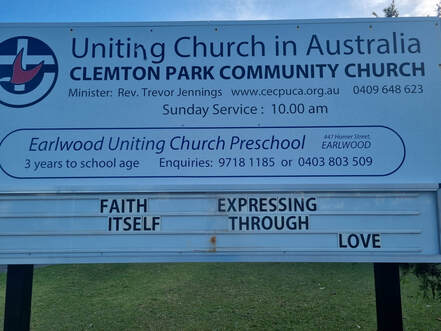 When we celebrate Holy Communion, we not only have communion between us and God, or between me and God, but communion with each other. Before we come to the table, we prepare ourselves to approach God. When celebrating Holy Communion in the Methodist Church tradition the service begins with the Prayer of Humble Access including the words derived from the Syrophoenician Woman's encounter with Jesus while he was having a meal in a house (Matthew 15:21-28) - 'We are not worthy even to gather up the crumbs under your table.' We have been taught to reverently approach God, to reverently approach the table and to reverently receive the bread and wine that is offered to us as the body and blood of Christ but what about reverence for each other. God is not just present in the bread and wine but also in those who gather with us. Gathering to celebrate Holy Communion is an opportunity to approach one another with the same humility and awe with which we approach God. John O 'Donohue says, 'The way we are present to each other is frequently superficial' (p.24 of his book Beauty). He says we have become more interested in connection than communion. We lose the rich potential for friendship and love remains out of reach. We can’t just fix our eyes upon Jesus without approaching the people around us. When we approach each other with reverence something awakens between us - the hidden beauty of God is revealed. This awareness is of a much deeper connection than we could have thought. This connection is alive with grace and mercy, kindness and compassion, understanding and empathy. An awareness that we are one. It is truly communion. When you next approach the table remember that we also approach one another. Prayer of Humble Access We do not presume to come to this your table, merciful Lord, trusting in our own righteousness, but in your manifold and great mercies. We are not worthy so much as to gather up the crumbs under your table. But you are the same Lord whose nature is always to have mercy. Grant us therefore, gracious Lord, so to eat the flesh of your dear Son Jesus Christ, and to drink his blood, that we may evermore dwell in him and he in us. Amen.
0 Comments
 This is the first in a series of questions to contemplate as we prepare for some mission planning Who am I? If someone asks us, who are you? One common response is to respond with our name. I am Trevor Jennings. Then if they prod a bit more, we might say I am a Uniting Church minister or I am a forklift driver, or I am a mother or I am a daughter, or I am Australian, or I am Tongan, or I am from Clemton Park. We see our identity tied to work, relationships, education, religion, sexuality, ethnicity etc. If we think someone is judging us in some way or they stay something condescending about us that hurts, we may say to ourselves, they don’t know me, they don’t know who I really am. Sometimes we like to tell others, I am an introvert, or I am an extrovert, to explain ourselves and our behaviour, or we may find comfort in a psychological diagnosis. From our birth we forge our identity from the world around us and our ideas of ourselves are shaped by our experiences and education, by those who raise and influence us, and increasingly through social media etc. These are all external environmental factors in our identity formation and of course there is a continuous internal dialogue processing it all. When we are not happy with who we are or who we think we have become, we often seek help. Sometimes the help we seek can be far from helpful, for example if we try to become someone else through drugs or alcohol. Sometimes we might seek help through counselling to understand ourselves or to change our thinking about ourselves or just to find ourselves. But do we ever know who we really are? What is our true self? Likewise, when it comes to mission planning in the church and we ask the question, who are we; we tend to answer with a set of beliefs – we are the body of Christ, we are followers of Jesus, we are the Uniting Church, we are a bible believing church, we are inclusive, we are a welcoming congregation etc. Is what we say about ourselves and what we say we believe, really who we are? Could asking ourselves, who am I, be a deeply spiritual question, a spiritual search in itself? Richard Rohr says, for Christians who have gone into their own depths they have uncovered an indwelling presence -a deep loving ‘yes’, God immanent, the Holy Spirit within, our deepest truest self, God the very ground of our being’. He says some mystics have described this presence as “closer to me than I am to myself” or “more me than I am myself” or as Thomas Merton called it -the true self. Contemplate the following – ‘this presence is more me than I am myself’. In his book ‘Beauty’, John O’Donohue says that faith is both an attraction to the divine and a response to God’s beauty and that ‘Love changes the way we see ourselves and others’ - ‘love turns up the hidden light within a person’s life’ and that ‘the beauty of God increases and deepens our own beauty. Why are the questions ‘Who am I?’ and ‘Who are we?’ so important to any attempt in making a mission plan? How may this question shape what we do and how we do it? |
AuthorMinister of Campsie Earlwood Clemton Park Uniting Church Congregation Archives
March 2024
Categories
All
|

 RSS Feed
RSS Feed
